Kenya dig it?
Olympic champions Chebet and Kipyegon set world records in women's 5,000 and 1,500 in Prefontaine Classic
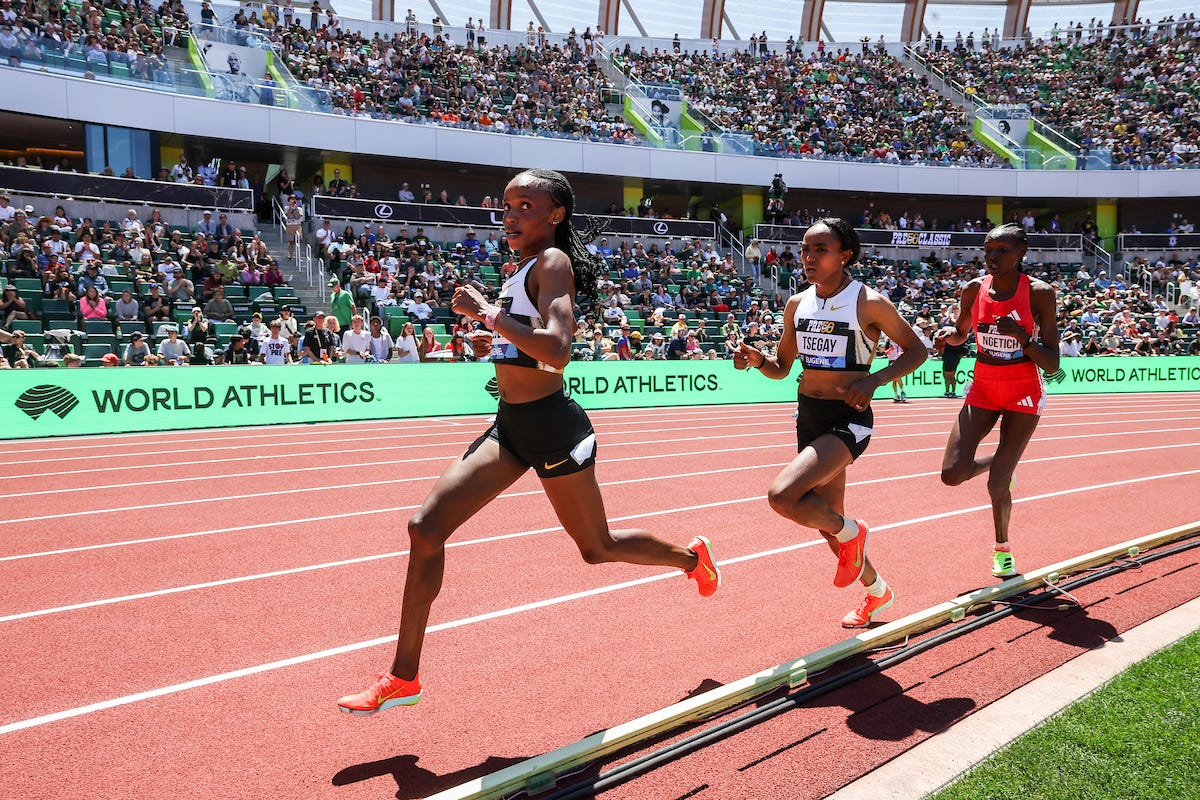
Olympic gold medalists Beatrice Chebet and Faith Kipyegon of Kenya set a pair of world records in the women’s 5,000 and 1,500 meters, respectively, in the 50th edition of the Prefontaine Classic in Eugene, Oregon, on Saturday.
Chebet, the winner of the 5,000 and 10,000 in last year’s Olympic Games in Paris, became the first woman in history to break 14 minutes on the track in the former event when she clocked 13:58.06 in the meet at the University of Oregon’s Hayward Field.
Kipyegon, who won an unprecedented third consecutive Olympic title in the 1,500 in Paris, ran 3:48.68 while bettering her world record of 3:49.04 from last year.
Seven other athletes produced yearly world-leading marks in their respective events on Saturday, but the diminutive Chebet and Kipyegon stood tallest in the meet that also saw Olympic champion Winfred Yavi of Bahrain run the third-fastest time ever in the women’s 3,000-meter steeplechase when she clocked 8:45.25.
After running 14:03.69 to win the 5,000 in the Golden Gala Pietro Mennea meet in Rome on June 6, Chebet was intent on taking a shot at Ethiopian Gudaf Tsegay’s world record of 14:00.21 — set in the 2023 Prefontaine Classic — when she toed the starting line on Saturday. And she was quick to point to the infield video board when her world record was displayed just after she had crossed the finish line.
“I’m so happy; after running in Rome, I said I have to prepare for a record, because in Rome I was just running to win a race, but after running 14:03, I said that ‘I’m capable of running a world record,’ ” Chebet said in quotes on the meet website. “So, let me go back home, and then come to Eugene. When I was coming here to Eugene, I was coming to prepare to run a world record, and I said ‘I have to try.’ ”
She added that she received extra motivation because she knew Kipyegon was also going to be shooting for a world record when she ran in the final event of the meet.
“I said ‘If Faith is trying, why not me?’ And today, I’m so happy because I’ve achieved being the first woman to run under 14. I’m so happy for myself.”
Chebet, the two-time defending World cross country champion, had dipped under 14 minutes in a 5-kilomter road race on December 31, 2023, when her 13:54 clocking in Barcelona, Spain, crushed her world record of 14:13. However, not all of the world’s top distance runners compete on the roads. Therefore, breaking 14 on the track was viewed as a more significant accomplishment that doing so on the roads.
Chebet ran in third place when No. 1 pacesetter Klaudia Kazmierska led the field through the first kilometer of Saturday’s race in 2:47.07 and she was in second when No. 2 pacemaker Dorcus Ewoi was in first when she passed 2,000 meters in 5:35.37.
Chebet, who had set a world record of 28:54.14 in the 10,000 in last year’s Prefontaine Classic, was in the lead when she completed six laps. But Tsegay and Kenya’s Agnes Ngetich were not far behind her when she went through 3,000 meters in 8:22.96 and 4,000 in 11:14.12, and Tsegay was still close to her with 200 meters to go.
However, Chebet shifted gears with about 160 meters remaining and the race for first place was over within a few strides as Chebet ran the second-to-last 100-meter segment of the race in 14.6 seconds before being credited with a 14.2 split for her final 100.
Chebet ran her final lap in 62.4 seconds and her last kilometer in 2:43.94 while finishing ahead of second-place Ngetich, who ran 14:01.29, and third-place Tsegay, who clocked 14:04.41.
Ngetich’s time demolished her previous best of 14:25.80 that she had set in winning a race in a Grand Slam Track meet in Miramar, Florida, on May 2, and Tsegay’s time was the second-fastest of her career and the fifth-fastest ever.
Margaret Akidor of Kenya finished fourth in a personal best of 14:30.34 and compatriot Caroline Nyaga placed fifth in 14:30.45 in the contest that served as Kenya’s qualifying race for World Athletics Championships in Tokyo from Sept. 13-21.
Chebet attributed discipline and hard work to her world record and added that “my coach and my husband have been there assisting me in everything I’m doing in training and supporting me, and Faith has been a close friend to me.”
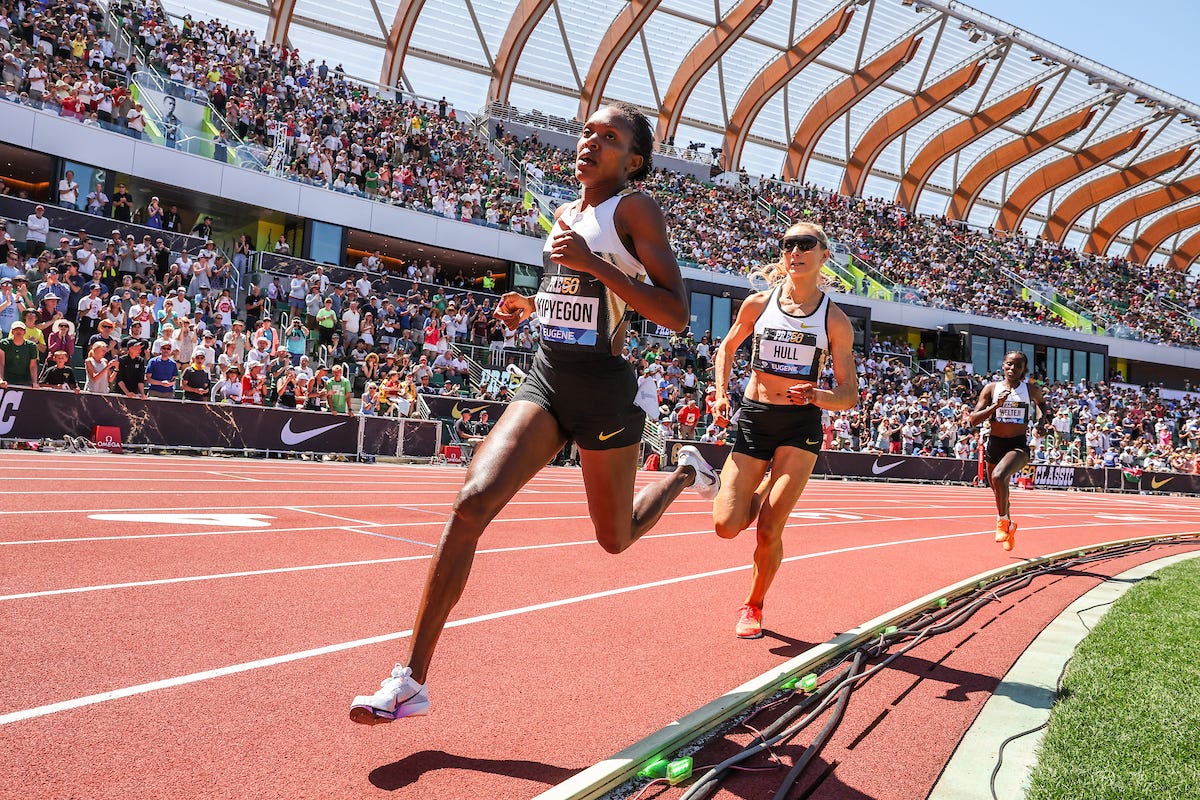
Kipyegon was running in her third race of the season as she had run 2:29.21 in the 1,000 meters in a Diamond League race in Xiamen, China, on April 26, and 4:06.42 in a mile in an exhibition event in Paris on June 26.
Thirteen pacesetters had started the race with Kipyegon in that Nike-sponsored effort that was designed to help her become the first woman in history to tun a mile in under four minutes. And though her 4:06.42 clocking was faster than the world record of 4:07.64 which she had set in 2023, it was not eligible for record consideration for a variety of reasons, including the fact that Kipyegon was the only woman who ran the entire distance.
Saturday’s race met all the requirements for world record consideration and Kipyegon proceeded to lower the global best in the 1,500 for the third time in the last three seasons.
She was in second place when pacesetter Sage Hurta-Klecker came through the first lap in 61.61 seconds and 800 meters in 2:03.17. And after Hurta-Klecker dropped out around the end of the backstretch, Kipyegon entered the home straightaway for the penultimate time with Jessica Hull of Australia and Diribe Welteji of Ethiopia not far behind her.
Welteji had dropped back a little with a lap to go, but Hull stayed very close to Kipyegon until the Kenyan began to edge away from her just before she passed 1,200 meters in 3:04.68.
Kipyegon’s lead had grown to a second over Hull with 200 meters to go and she was two seconds ahead of second-place Welteji with 100 meters left in the race.
Kipyegon was in full flight at that point, and with the crowd urging her on and a look of excitement on her face, she ran her final 100 in 14.1 seconds and her last 300 in 44.00 to trim .36 seconds off the world record of 3:49.04 that she had run in the Meeting de Paris Diamond League meet last year.
Welteji finished second in 3:51.44 to move to eighth on the all-time performer list, followed by Olympic silver medalist Hull in 3:52.67.
Olympic bronze medalist Georgia Hunter Bell of Greg Britain finished fourth in 3:54.76 and Nikki Hiltz of the U.S. was fifth in 3:55.96.
“This is the time I was expecting when I was in Paris, I say it’s still possible to run under 3:49, and I’m just so grateful,” Kipyegon said. “I thank God, I thank my management, I thank my coach and all of the support system who have been supporting me through this journey, so it feels amazing.”
Yavi had entered the Prefontaine meet on a three-race losing streak to Olympic bronze medalist Cherotich in the steeplechase, but that trio of losses had come by a combined total of .85 seconds.
Yavi ran in second or third place for much of the race on Saturday as Olympic silver medalist Peruth Chemutai of Uganda led the field through the first kilometer in 2:56.61 and two kilometers in 5:55.39.
She was in second place behind Chemutai heading down the backstretch for the second to last time, but she moved into the lead approaching the water jump and never trailed again.
She had a lead of about six meters over Cherotich with a lap to go, but she widened her advantage around the first turn before really moving away from the Kenyan down the backstretch.
Perhaps sensing that the victory was well in hand, she exited the final water jump with a huge lead and put everything she had into getting to the finish line as quickly as possible. Her effort was so great that her legs almost buckled with a couple of strides to go, but her time of 8:45.25 was less than a second off the world record of 8:44.32 set by Beatrice Chepkoech of Kenya in 2018, as well as the second fastest of her career.
Cherotich finished second in 8:48.71, and she was followed by Chemutai in third in 8:51.77, 2022 World champion Norah Jeruto of Kazakhstan in fourth in 8:59.46, and Sembo Almayew of Ethiopia in fifth in 8:59.90 in the first race in history in which five women ran under nine minutes.
Cherotich’s time was the fifth fastest ever and moved her to fourth on the all-time performer list and Chemutai’s clocking was the eighth fastest in history and the second fastest of her career.
Almayew became the 15th woman to have run under nine minutes in the steeplechase with her performance.
“Honestly, I just wanted to execute whatever I have in my body and I knew I was gonna be first,” Yavi said on the meet website. “The plan was to come, run my own race, and dig in.”
The two closest finishes in the meet came in the Bowerman Mile, won by Niels Laros of the Netherlands in a yearly world-leading outdoor time of 3:45.94, and in the men’s 10,000, taken by Biniam Mehary of Ethiopia in 26:43.82.
The 20-year-old Laros, who was running in his first mile or 1,500-meter race of the season, came from far behind on the final lap to finish a hundredth of a second in front of Olympic 1,500 bronze medalist Yared Nuguse of the U.S.
Azeddine Habz of France finished third in 3:46.65, and he was followed by Olympic 1,500 champion Cole Hocker of the U.S. in 3:47.43, Reynold Cheruiyot of Kenya in 3:47.46, and 19-year-old Cam Myers of Australia in 3:47.50.
Laros moved to seventh on the all-time performer list with his time and Habz is now 10th, followed by Hocker at 19th and Cheruiyot at 20th.
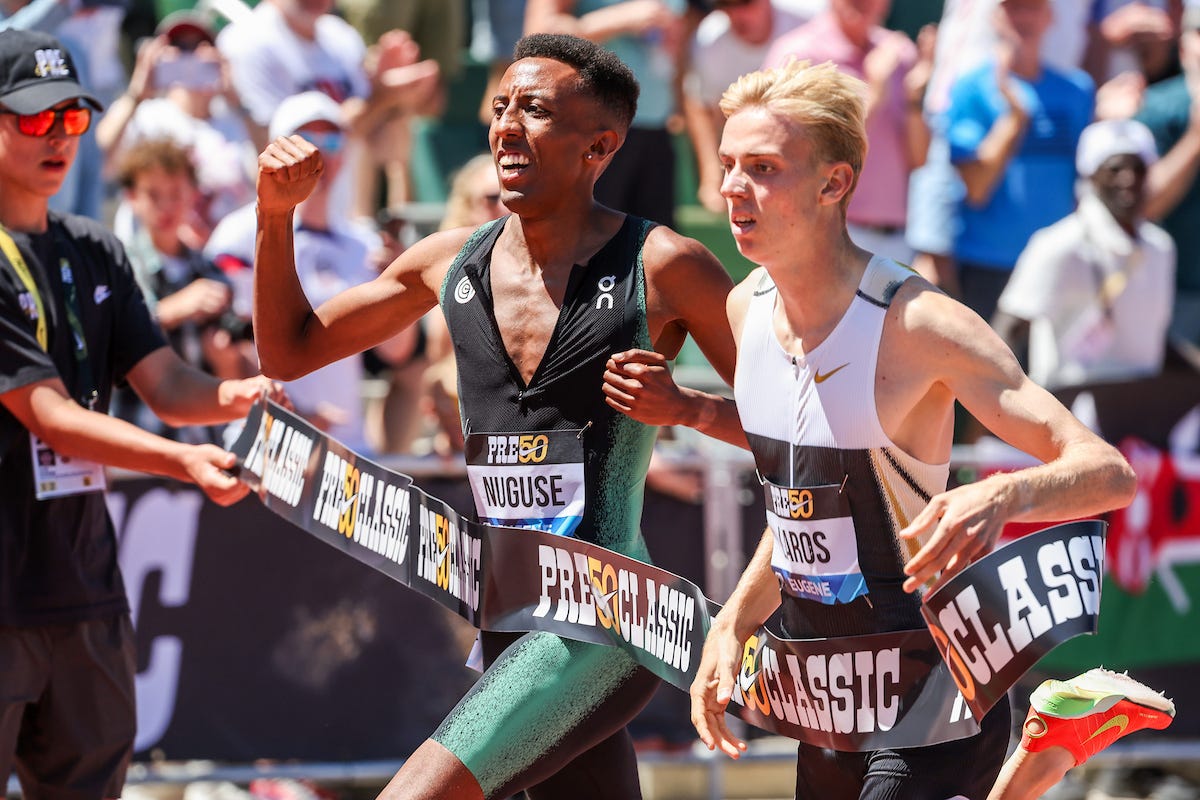
The race for first place appeared to be down to Nuguse and Habz when the American went through 1,200 meters in 2:48.3, followed by the French runner at 2:48.6. But Laros, who was in third place in 2:51.4, began to make up some ground on the leading duo going down the backstretch and he really began to reel in Habz midway through the final turn.
Nuguse appeared to be uncatchable at that point, but he too was slowing after having run the first 800 meters of the race in 1:51.2.
Laros was still in third place, 1.7 seconds back of Nuguse when the American passed 1,500 meters in 3:30.4. But the Dutch runner was gaining rapidly, and when Habz left the inside of lane one open, Laros went past his fading opponent with about 40 meters to go before he outleaned Nuguse at the finish line.
Laros’ time crushed his previous best of 3:48.93 from 2023, but he had clocked 3:49.45 in a Diamond League meet in London last year when he fell down early in the race before finishing fourth.
“I feel great, you saying ‘winner of the Bowerman mile’ doesn't really sound real to me right now, so I'm just amazed by how the race went,” Laros said. “I talked to my coach yesterday and because it my opening 15-mile of the season, I wasn’t so confident. He said ‘Let's see’, and, I mean, winning here takes a miracle, but then he said ‘But you’re a special boy, so I wouldn’t be surprised,’ and he was right.”
The 18-year-old Mehary won the 10,000 ahead of a pair of vastly more experienced compatriots as his 26:43.82 clocking left him in front of 2024 Olympic silver medalist Berihu Aregawi in 26:43.84 and 2021 Olympic champion Selemon Barega in 26:44.13.
They were followed by Kenyans Edwin Kurgat in fourth place in 26:46.35 and Ishmael Kipkurui in fifth place in 26:47.72. Kipkurui had run a yearly world-leading and collegiate-record time of 26:50.21 as a freshman at the University of New Mexico in late March.
Benson Kiplangat of Kenya had led the field through the first 5,000 meters in 13:14.17 on Saturday and he was still in the lead when he went through seven kilometers in 18:42.91. But Mehary was in front when he passed 8,000 meters in 21:28.71 and 9,000 in 24:13.16, and he finished just ahead of Aregawi for the victory.
The three other yearly world-leading marks were produced by Botswanan Letsile Tebogo in the men’s 200 meters and by Americans Rudy Winkler in the men’s hammer throw and Joe Kovacs in the men’s shot put.
In addition, Tara Davis-Woodhall of the U.S. won the women’s long jump with a mark that was tied for the top outdoor performance in the world this year.
Tebogo has had a so-so season in the 100 and 400 this year, but he won his third 200 without a loss when he clocked 19.76 seconds to turn back second-place Courtney Lindsey of the U.S., who ran 19.87, and third-place Alexander Ogando of the Dominican Republic, who timed 19.94.
Lindsey gave Tebogo a good run for his money for the first 160 or so meters of the race, but the Botswanan drew away from him after that before easing up in the last couple of strides.
Kenny Bednarek of the U.S., the silver medalist in the last two Olympic Games and the winner of the 100 and 200 in the three Grand Slam Track meets held earlier this season, was a late withdrawal from the 200.
Winkler upped his U.S. record to 83.16 meters (272 feet 10 inches) in the hammer throw while defeating defending Olympic and World champion Ethan Katzberg of Canada.
Katzberg placed second with a best of 81.79 (268-4) and Olympic bronze medalist Myhaylo Kokhan of Ukraine finished third at 79.27 (260-1).
Winkler’s top throw came in the third round and topped his previous national record of 82.71 (271-4) that he had set in the 2021 U.S. Olympic Team Trials.
Kovacs entered the Prefontaine Classic with one win in four meets this season, but the three-time Olympic silver medalist won the shot put with his third-round effort of 22.48 (73-9) and his second-round put of 22.35 (73-4) would also have been good enough for the victory.
Roger Steen of the U.S. finished second at 22.11 (72-6½) and he was followed by Chukwuebuka Enekwechi of Nigeria at 22.10 (72-6¼), Adrian Piperi of the U.S. at 22.09 (72-5¾), and Olympic bronze medalist Rajindra Campbell of Jamaica at 22.04 (72-3¾).
Steen, Enekwechi, and Piperi all set personal bests, and Enekwechi’s mark was also an African record.
Davis-Woodhall went from third place to first on the final attempt of the women’s long jump competition when she spanned 7.07 (23-2½) after having a previous best of 6.75 (22-1¾).
It was the 12th consecutive victory for the Olympic and 2024 World indoor champion and the ninth time in her last 10 meets that she has jumped 7.00 (22-11¾) or farther.
Olympic silver medalist Malaika Mihanbo of Germany placed second at 7.01 (23-0) and Claire Bryant of the U.S., this year’s World indoor champion, finished third at 6.80 (22-3¾).
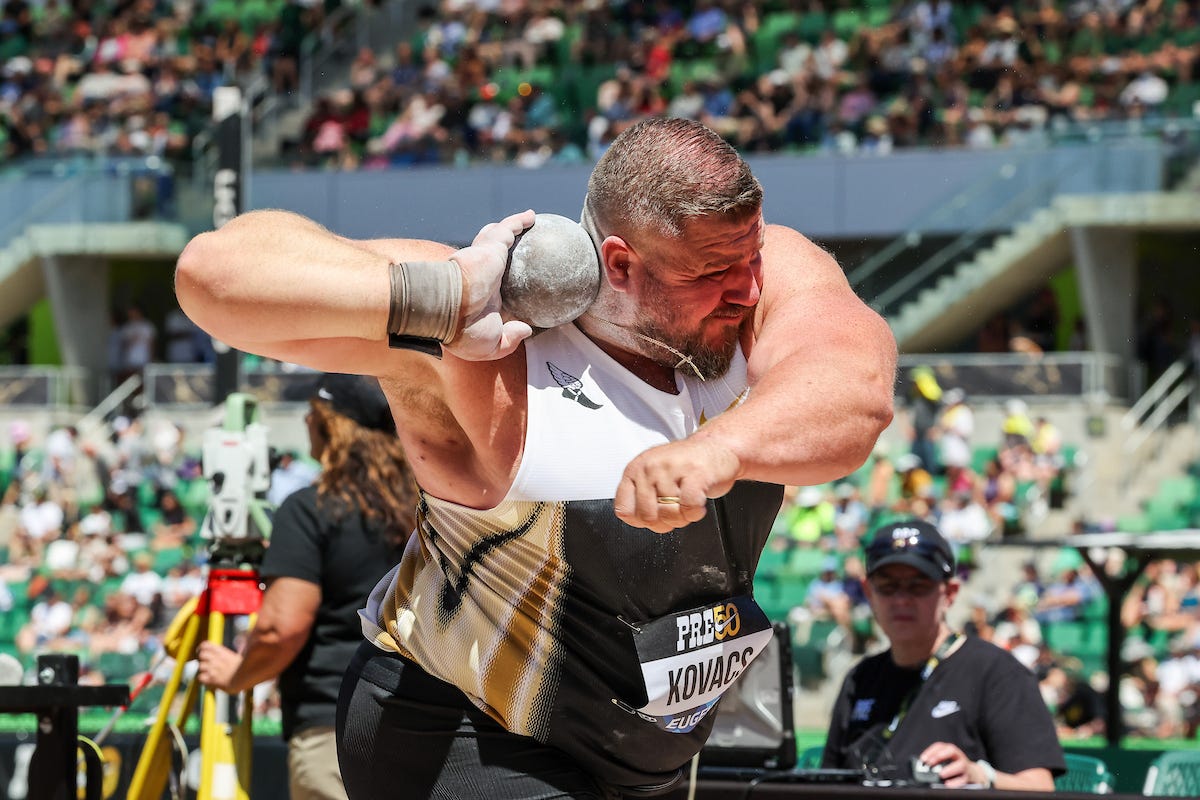
In other men’s track events, Kishane Thompson of Jamaica won the 100 in 9.85, Matthew Hudson-Smith of Great Britain took the 400 in 44.10, and Alison dos Santos of Brazil placed first in the 400 intermediate hurdles in 44.65.
In other men’s field events, Mondo Duplantis of Sweden won the pole vault at 6.00 (19-8¾) and Mykolas Alekna of Lithuania placed first in the discus with a best of 70.97 (232-10).
Trayvon Bromell of the U.S. beat Olympic silver medalist Thomson out of the blocks in the 100, but the Jamaican had taken control of the race at the midway point and he ended up finishing comfortably in front of second-place Zharnel Hughes of Great Britain, who ran 9.91, and third-place Bromell, who timed 9.94.
Olympic silver medalist Hudson-Smith won a hard-fought 400 in which Americans Christopher Bailey, Jacory Patterson, and Khaleb McRae finished second, third, and fourth respectively, with times of 44.15, 44.31, and 44.45.
McRae, who had run 43.91 last month, was battling Hudson-Smith for first place early in the home straightaway, but it was World indoor champion Bailey who made a late charge at the Brit.
Olympic champion Quincy Hall of the U.S. did not run in the race as he had been previously scheduled to do.
Dos Santos, the two-time Olympic bronze medalist in the intermediate hurdles, outdueled Olympic champion Rai Benjamin of the U.S. in the home straightaway as his 46.65 clocking left him six hundredths of a second in front of Benjamin, who ran 46.71.
Nathaniel Ezekiel of Nigeria, the NCAA champion for Baylor, finished third in 47.88 in a race in which Benjamin’s winning streak in the 400 intermediate hurdles was snapped at seven.
Duplantis, the two-time defending Olympic and World outdoor champion in the pole vault, posted his 30th consecutive victory in that event when he cleared 6.00 (19-8¾) on his second attempt. He then missed all three of his tries at a world-record height of 6.29 (20-7½).
Olympic silver medalist Sam Kendricks and U.S. compatriot Austin Miller each cleared 5.80 (19-¼) on their first attempts, but Kendricks placed second because he had fewer total misses than Miller.
Ralford Mullings of Jamaica had upset Alekna for the NCAA discus title last month while throwing for the University of Oklahoma, but Alekna dominated the rematch on Saturday as he had the top five throws in a competition in which Mullings placed second at 68.98 (226-3).
Daniel Stahl of Sweden was third at 68.59 (225-0) and Olympic champion Roje Stona of Jamaica placed fourth at 65.62 (215-3).
Alekna, who will throw for Oregon next year after having competed for Cal while earning an undergraduate degree in psychology, registered his top mark of 70.97 (232-10) in the second round. He also had throws of 70.64 (231-9) in the fifth round, 69.80 (229-0) in the fourth, 69.79 (228-11) in the first, and 69.65 (228-6) in the sixth.
The three women’s throwing events combined to produce a slew of top performances.
Chase Jackson of the U.S. won the women’s shot put at 20.94 (68-8) a week after she had upped her national record to 20.95 (68-8¾) in the Iron Wood Throws Classic in Rathdrum, Idaho.
The two-time defending World outdoor champion also had an effort of 20.34 (66-8) in a deep competition in which two-time defending World indoor champion Sarah Mitton of Canada placed second at 20.39 (66-10).
Three other competitors exceeded 20 meters (65-7½) as Jaida Ross of the U.S. finished third at 20.13 (66-0), Olympic silver medalist Maddison-Lee Wesche of New Zealand placed fourth at 20.06 (65-9), and Jessica Schilder of the Netherlands was fifth at 20.03 (65-8).
Ross’ mark moved her to sixth on the all-time U.S. performer list and Wesche’s effort made her the second New Zealand putter to have topped 20 meters.
Valerie Adams, the Olympic champion in 2008 and ’12, set the New Zealand record of 21.24 (69-8¼) in 2011.
Valarie Allman of the U.S. won the discus with a best of 70.68 (231-10) and the two-time defending Olympic champion also had throws of 69.48 (227-11) and 69.18 (226-11) while winning her 26th consecutive competition.
Cierra Jackson finished second at 67.82 (222-6), followed by Sandra Elkasevic of Croatia at 66.97 (219-8).
Jackson, who had capped her senior season at Fresno State by winning the NCAA title last month, only had one fair throw on Saturday, but it moved her to seventh on the all-time U.S. list.
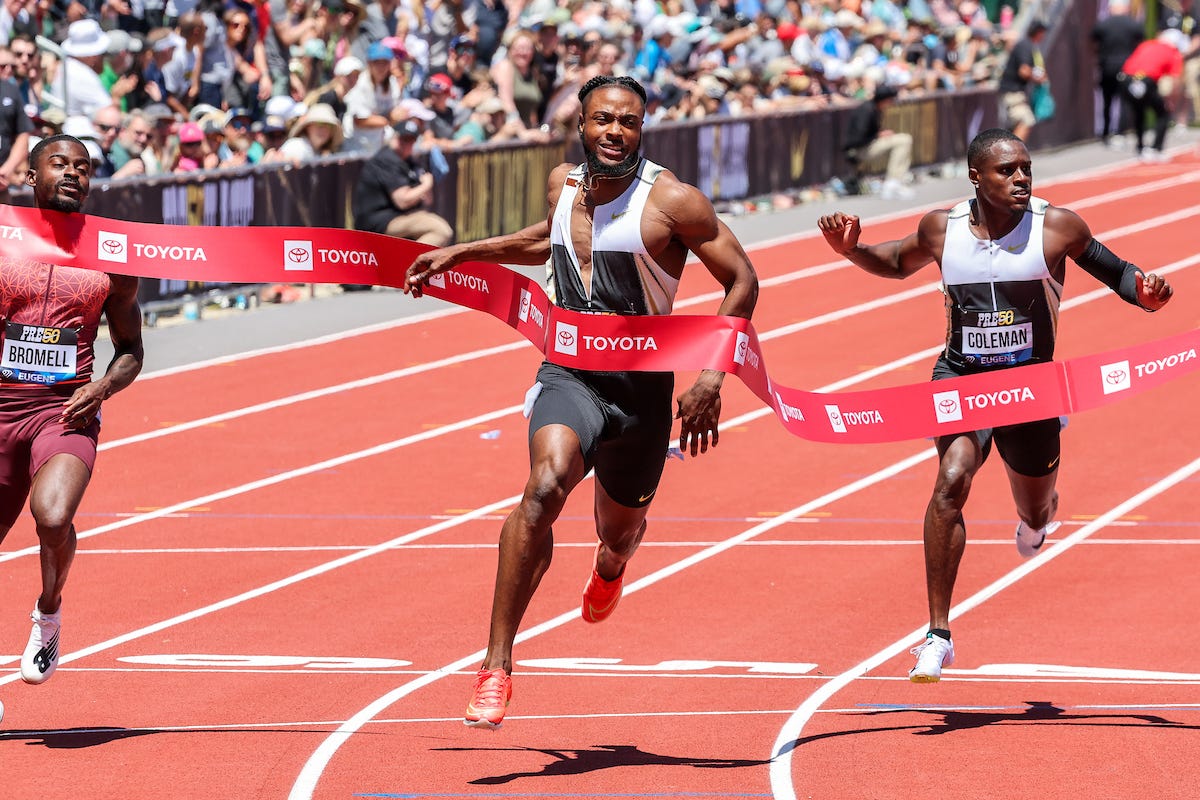
Camryn Rogers of Canada won the hammer throw with a national record of 78.88 (258-9) while defeating a pair of former World champions from the U.S. in Brooke Andersen and DeAnna Price.
Andersen, the 2022 World champion, had a best of 76.95 (252-5), with 2019 champion Price at 75.35 (247-2).
Rogers, the reigning Olympic and World champion, moved to fifth on the all-time performer list with her winning effort that topped the previous national record of 78.62 (257-11) that she had set in 2023.
In other women’s track events, Melissa Jefferson-Wooden of the U.S. won the 100 in 10.75 seconds, Sydney McLaughlin-Levrone of the U.S. placed first in the 400 in 49.43, Tsige Duguma of Ethiopia took the 800 in 1:57.10, and Ackera Nugent of Jamaica won the 100 hurdles in 12.32.
Jefferson-Wooden won her fourth 100 of the season without a loss after she beat Olympic champion Julien Alfred of St. Lucia out of the blocks and then kept her at bay during the second half of a race that was run into a breeze of 1.4 meters per second.
Alfred timed 10.77 while finishing second and Marie-Josee Ta Lou-Smith of Cote d’Ivoire placed third in 10.90.
Sha’Carri Richardson of the U.S., who has reportedly had her training slowed by an injury, finished ninth in 11.19 after having previously run 11.27 in her season opener in Tokyo on May 18.
She had run a personal best of 10.65 in winning the 2023 World championships in Budapest, Hungary.
McLaughlin-Levrone, the two-time defending Olympic champion in the 400 hurdles, won the 400 in 49.43 after drawing away from NCAA champion Aaliyah Butler in the final 150 meters of the race.
Butler, who just completed her junior season at the University of Georgia, timed 49.86 in second place and she was followed by Isabella Whittaker of the U.S., who timed 50.81 in third.
Olympic silver medalist Duguma won the 800 in 1:57.10 after holding off Prudence Sekgodiso of South Africa in the home straightaway.
World indoor champion Sekgodiso ran 1:57.16 to tie her personal best and she was followed by 2019 World champion Halimah Naakayi of Uganda, who placed third in 1:57.89.
Mary Moraa of Kenya, the 2023 World champion, placed ninth in 2:00.51, and 2021 Olympic and 2022 World champion Athing Mu-Nikolayev of the U.S. finished 10th in 2:03.44.
Mu-Nikolayev had lowered her U.S. record to 1:54.97 in winning the Prefontaine Classic in September of 2023, but she has struggled mightily since that performance.
Nugent ran her second-fastest time of the season in the 100 hurdles as her 12.32 clocking gave her a comfortable margin of victory over 2022 World champion and world record-holder Tobi Amusan of Nigeria, who finished second in 12.38.
Americans Keni Harrison and Olympic champion Masai Russell placed third and fourth with times of 12.50, and 2015 and ’23 World champion Danielle Williams of Jamaica was fifth in 12.51.
Tia Jones of the U.S., who had moved to third on the all-time list when Russell and her ran 12.17 and 12.19, respectively, in a Grand Slam Track meet in Miramar, Florida, in early May, did not finish the race on Saturday.



